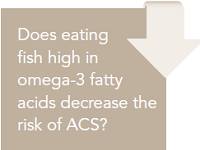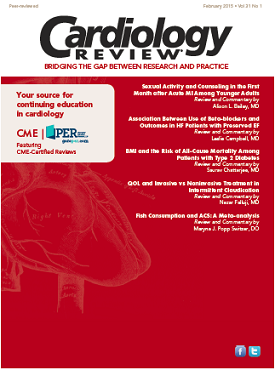Publication
Article
Cardiology Review® Online
Fish Consumption and ACS: A Meta-Analysis
Author(s):
The American Heart Association was one of the first organizations to advocate dietary changes to decrease the risk of coronary heart disease (CHD). The organization's first recommendation appeared in 1957 advising a decrease in the amount of fat intake to decrease atherosclerosis risk. Today, a different approach is recommended, which considers the diet as a whole, with recommendations of what to both include and avoid. Among other nutritional and lifestyle recommendations, the AHA advises the consumption of 2 servings of fish weekly for both men and women.

Maryna J. Popp Switzer, DO
Review
Leung Yinko SS, Stark KD, Thanassoulis G, Pilote L. Fish consumption and acute coronary syndrome: a meta-analysis.Am J Med. 2014;127:848-857.

The American Heart Association (AHA) was one of the first organizations to advocate dietary changes to decrease the risk of coronary heart disease (CHD). The organization’s first recommendation appeared in 1957 advising a decrease in the amount of fat intake to decrease atherosclerosis risk.1 Today, a different approach is recommended, which considers the diet as a whole, with recommendations of what to both include and avoid. Among other nutritional and lifestyle recommendations, the AHA advises the consumption of 2 servings of fish weekly for both men and women.
Study Details
Fish is a well-known source of omega-3 fatty acids, which have shown to be beneficial in cardiac health. Fish and omega-3 fatty acids in supplemental form have been investigated to further evaluate their benefits. Omega-3 as a supplement has been shown to affect modifiable risk factors for CHD, but the direct effect on prevention of acute coronary syndrome (ACS) or CHD has been controversial.
This meta-analysis by Leung Yinko et al was performed to assess the relationship between fish consumption and ACS. A subset of data was extracted to look at the dose-dependent effects of consuming fish. After a thorough search and extraction from MEDLINE and Embase databases from 1966 to June 2013, 19 studies were selected for review, comprising 11 prospective cohort and 8 case-control studies. The final patient population consisted of 408,305 participants; there were slightly more women (52.9%) and middle-aged individuals (mean age, 47-62 years).The analysis specifically looked at primary prevention. Therefore, the population studied consisted of healthy individuals with no prior history of ACS.
Follow up ranged from 4 to 30 years (mean, 11.2 years). In subgroup analyses of the prospective cohort studies and case-control studies, no significant variations were observed in risk reduction of ACS in both genders. Fish intake amount was standardized by converting frequency into grams per day, with 100g being a standard portion size.
The results demonstrated that fish consumption decreases the risk of ACS in a dose-dependent manner. The highest category of fish intake, described as ≥4 servings per week, was associated with a 21% reduced risk of ACS (relative risk [RR], 0.79; 95% confidence interval [CI], 0.69-0.90), the greatest risk reduction seen among all the categories. A dose-dependent relationship was not statistically significantin case-control-only studies, but was seen in prospective cohort studies, a group containing better-quality studies as described by the Newcastle Ottawa scale.Men and women were analyzed separately, and there was no significant difference in risk reduction in either gender. Age was also not a factor: the results showed no differences across age groupsfor association with ACS. Mean age of the population studied, however, was quite narrow, and therefore further investigation might be needed to better address this question. In summary, the authors concluded that fish is beneficial in the primary prevention of ACS as evidenced by an inverse and dose-dependent relationship. They demonstrated that the risk of ACS decreases by 5% with every100-g/week increase of fish consumption (RR per serving, 0.95; 95% CI, 0.92-0.97).
COMMENTARY
Lifestyle modifications have long been considered important to prevent CHD and other diseases such as hypercholesteremia and type 2 diabetes mellitus. It is more important than ever for clinicians to provide appropriate guidance and counseling to patientsabout prudent nutritional choices giventhe overwhelming influence of media, with its ever-changing array of new diets and cleanses advertised on nearly every magazine cover or television commercial.
Multiple food products have been examined because of their potentially health-affecting properties. Omega-3 fatty acid supplements have been widely chosen. Recent literature suggests that fish consumption has a better effect on cardiovascular health compared with omega-3 supplements. Supplementation with omega-3 fatty acids has been shown to decrease triglycerides and is widely used for treatment of hypertriglyceridemia. A modest reduction of risk of heart failure was also observed in individuals with higher concentration of eicosapentaenoic acid and docosahexaenoic acid (EPA/DHA) in the blood, omega-3 fatty acids that are found in fish.2 However, the data were inconclusive regarding direct benefit to reduce ACS or CHD risk. In fact, most recent meta-analyses demonstrated no evidence of benefit of omega-3 supplementation for risk reduction of coronary events such as myocardial infarction.3,4 Leung Yinko et al highlight some of the possible explanations of the differences that have been observed between fish and omega-3 supplements. Some of the explanations include better bioavailability of nutrients and incorporation of EPA and DHA into lipids from fish; better adherence to diet that includes fish opposed to daily regimen of supplementation; or perhaps other unmeasured nutrients and minerals found in fish also play a cardioprotective role.
Fish consumptionhas now been shown to reduce risk of ACS, among its many other benefits on cardiovascular health. A 15% reduction in the risk of developing heart failure in both men and women was observed with increased fish consumption.2 Fish intake has also been demonstrated to decrease the risk of congestive heartfailure specifically in postmenopausal women. Consumption of >5 servings/week or baked or broiled fish is associated with a 30% decrease of heart failure.5 An increase in fish intake has also been associated with a moderate but significant reduction in cerebrovascular disease. On the contrary, consumption of omega-3 fatty acids as a supplement did not show a similar effect.6 Even with 1 to 3 serving of fish per month a benefit is observed in reducing the risk of ischemic stroke.7,8 Aninverse relationship was seen in individuals eating >5 serving per week, lowering risk of stroke by up 31%.7
Not all fish, however, provide the same benefits, and cooking method plays a significant role. Consumption of >1 serving of fried fish was associated with a 48% increase in heart failure risk.5 Consumption of baked or broiled fish, tuna being one of the types, was shown to be associated with a decreased incidence of atrial fibrillation in older adults. Furthermore, a lower incidence of arrhythmia-induced mortality in individuals with ischemic heart disease was seen in in the studies by Mozaffarian et al.9,10 This relationship was not seen with consumption of fried fish or fish sandwiches,which further supports the importance of preparation method.10
Another point to consider is that individuals with an overall diet that regularly includes fish—which is generally considered to be a healthier food option—tend on average to lead a healthier lifestyle that includes exercise and consumption of fruits and vegetables, which have also been shown to have a positive effect on cardiovascular health. Plant-based diets havealso been suggested to decrease incidence of coronary heart disease—the proposed mechanismof which is decreasing endothelial injury due to atherosclerosis, which in turn causes CHD.11 By definition, plant-based diets are low in fat, salt, and cholesterol, and consist of a lot of fruits and vegetables. A decrease of 73% in coronary events has been reported in a plant-based diet group compared with controls.11 Increased fiber intake from fruit and vegetables among other sources was also associated with an inverse relationship in risk reduction of CHD and CVD.12 One of the other factors that is likely to contribute to success is avoidance of foods that have been linked to CHD such as red meat. Processed meat in particular is associated with an 8% increase in incidence of heart failure in men with every 50g of daily consumption.13
So what can we tell our patients? Fish consumption is beneficial, with multiple positive effects on cardiovascular health, including primary prevention of ACS. Both men and women should aim for at least 2 servings of baked or broiled fish per week as part of their comprehensive health plan.
References
1. Dalen JE, Devries S. Diets to prevent coronary heart disease 1957-2013: what have we learned? Am J Med. 2014;127:364-369.
2. Djoussé L, Akinkuolie AO, Wu JH, Ding EL, Gaziano JM. Fish consumption, omega-3 fatty acids and risk of heart failure: a meta-analysis. Clin Nutr. 2012;31:846-853.
3. Kotwal S, Jun M, Sullivan D, Perkovic V, Neal B. Omega 3 fatty acids and cardiovascular outcomes: systematic review and meta-analysis. Circ Cardiovasc Qual Outcomes. 2012;5:808-818.
4. Rizos EC, Ntzani EE, Bika E, Kostapanos MS, Elisaf MS. Association between omega-3 fatty acid supplementation and risk of major cardiovascular disease events: a systematic review and meta-analysis. JAMA. 2012;308:1024-1033.
5. Belin RJ, Greenland P, Martin L, et al. Fish intake and the risk of incident heart failure: the Women's Health Initiative. Circ Heart Fail. 2011;4:404-413.
6. Chowdhury R, Stevens S, Gorman D, et al. Association between fish consumption, long chain omega 3 fatty acids, and risk of cerebrovascular disease: systematic review and meta-analysis. BMJ. 2012;345:e6698.
7. He K, Song Y, Daviglus ML, et al. Fish consumption and incidence of stroke: a meta-analysis of cohort studies. Stroke. 2004;35:1538-1542.
8. Larsson SC, Orsini N. Fish consumption and the risk of stroke: a dose-response meta-analysis. Stroke. 2011;42:3621-3623.
9. Mozaffarian D, Lemaitre RN, Kuller LH, et al. Cardiac benefits of fish consumption may depend on the type of fish meal consumed: the Cardiovascular Health Study. Circulation. 2003;107:1372-1377.
10. Mozaffarian D, Psaty BM, Rimm EB, et al. Fish intake and risk of incident atrial fibrillation. Circulation. 2004;110:368-373.
11. Tuso P, Stoll SR, Li WW. A plant-based diet, atherogenesis, and coronary artery disease prevention. Perm J. 2014.Nov 24. doi: 10.7812/TPP/14-036. [Epub ahead of print]
12. Threapleton DE, Greenwood DC, Evans CE, et al. Dietary fiber intake and risk of first stroke: a systematic review and meta-analysis. Stroke. 2013;44:1360-1368.
13. Kaluza J, Akesson A, Wolk A. Processed and unprocessed red meat consumption and risk of heart failure: prospective study of men. Circ Heart Fail. 2014;7:552-557.
About the Author
Maryna J. Popp Switzer, DO, is a Resident in Internal Medicine at Texas Tech University Health Science Center, in El Paso, TX. Dr Switzer received her medical degree at West Virginia School of Osteopathic Medicine in Lewisburg, WV.






